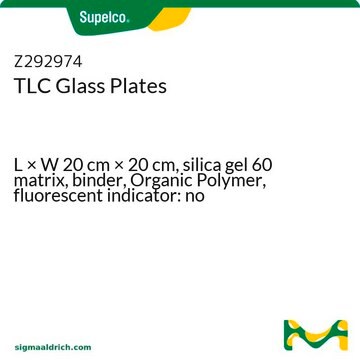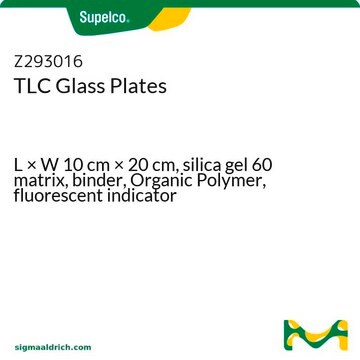1.05626
Plaques TLC, Gel de silice 60
pkg of 50 plates, plate L × W 20 cm × 10 cm, glass support
Synonyme(s) :
Silica Gel 60 TLC Plates
About This Item
Produits recommandés
Matériaux
glass support
silica gel 60 matrix
Niveau de qualité
Caractéristiques
binder Organic Polymer
fluorescent indicator: no
Conditionnement
pkg of 50 plates
Technique(s)
thin layer chromatography (TLC): suitable
Épaisseur de la couche
250 μm
Plaque/Plateau, L × l
20 cm × 10 cm
Taille des particules
10-12 μm
Dimension de pores
60 Å medium pore diameter
Température de stockage
2-30°C
Catégories apparentées
Description générale
Application
- An eco-friendly and cost-effective HPTLC method for quantification of COVID-19 antiviral drug and co-administered medications in spiked human plasma.: This study by Ghozzy et al. (2024) presents a high-performance thin-layer chromatography (HPTLC) method using Silica gel 60 TLC plates. The method is used for quantifying antiviral drugs and co-administered medications in human plasma, emphasizing its eco-friendly and cost-effective nature (Ghozzy et al., 2024).
- Identification of variety-specific metabolites of basil by high performance thin layer chromatography-assisted metabolic profiling techniques.: Wulandari et al. (2023) used Silica gel 60 TLC plates in HPTLC to identify metabolites specific to different basil varieties, showcasing the technique′s capability in plant metabolomics (Wulandari et al., 2023).
- Separation and quantification of azelnidipine and chlorthalidone in a synthetic mixture using optimized HPTLC method.: Raimalani and Kotadiya (2024) developed an HPTLC method for separating and quantifying azelnidipine and chlorthalidone in a synthetic mixture, utilizing Silica gel 60 TLC plates for their analytical process (Raimalani and Kotadiya, 2024).
- Isolation, development and validation of HPTLC method for the estimation of β-carotene from Gymnosporia senegalensis (Lam.) Loes.: Jain et al. (2023) describe the isolation and validation of an HPTLC method for estimating β-carotene from Gymnosporia senegalensis, using Silica gel 60 TLC plates, highlighting its application in phytochemical analysis (Jain et al., 2023).
- Simultaneous Determination of Ceftazidime in Three Different Pharmaceutical Preparations Combined with Either Tazobactam, Tobramycin or Sulbactam by HPTLC-Spectrodensitometric Method.: Salem et al. (2023) applied Silica gel 60 TLC plates in their HPTLC-spectrodensitometric method to simultaneously determine ceftazidime in various pharmaceutical preparations, demonstrating its utility in pharmaceutical analysis (Salem et al., 2023).
Liaison
Remarque sur l'analyse
Volume des pores (isotherme N₂) : 0,74 à 0,84 ml/g
d 50 (diffraction laser, distribution de la taille des pores) : 9,7 - 11,7 µm
Épaisseur de couche : 210 - 270 µm
Écart d'épaisseur de couche par plaque : ≤ 35 µm
Test chromatographique :
test de couleur
Valeurs hRf
- bleu vif organol, test de couleur, lipophile :
11 à 25
- Ceres Black G, dosage colorimétrique, lipophile : 34 à 48
- Ceres violet-brun, dosage colorimétrique, lipophile : 52 à 67
Indice de séparation (dosage colorimétrique, lipophile) : ≥ 10,5
Valeur typique déterminée sur une plaque conditionnée
Éluant : toluène (45 % d'humidité relative)
Code de la classe de stockage
10-13 - German Storage Class 10 to 13
Certificats d'analyse (COA)
Recherchez un Certificats d'analyse (COA) en saisissant le numéro de lot du produit. Les numéros de lot figurent sur l'étiquette du produit après les mots "Lot" ou "Batch".
Déjà en possession de ce produit ?
Retrouvez la documentation relative aux produits que vous avez récemment achetés dans la Bibliothèque de documents.
Les clients ont également consulté
Notre équipe de scientifiques dispose d'une expérience dans tous les secteurs de la recherche, notamment en sciences de la vie, science des matériaux, synthèse chimique, chromatographie, analyse et dans de nombreux autres domaines..
Contacter notre Service technique








